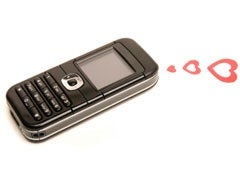5 Dating And Technology Rules You Need To Know
Romance rules for the digital age.

Technology has fundamentally changed the way we seek, nurture, and experience intimacy. Beyond the coy status updates, drunken emails and occasional sexting, we find soulmates on dating sites, we send "I <3 U's" with our thumbs, we fight over IM, make up over email, then go on Facebook to announce to the world our renewed devotion. Gadgets have enhanced our love lives, but they also enable mixed messages, vague sentiments and other bits of intentional or unintentional confusion. Texting Your Way To Love
The questions around protocol are endless: Should I text him or email him? She sounds sad in her blog post—but was that just for show? Should I update my Facebook status to "In a Relationship?" Did I just get a booty text?
What I offer here is not a magic decoder for the ambiguous texts/emails/pokes you will never stop receiving, nor a set of tried-and-true rules. That doesn't exist. These are merely lessons gathered from my own and others' experiences in bumbling with love in our digital age—lessons we hope will help detangle the medium from the message.
1. There is no hierarchy of communication.
(Or: Why "If he liked me more, he would have called, not texted" is a waste of time.)
I know it's hard to believe because there seems to be an order to things: email feels more meaningful than Facebooking. Texting feels casual. A phone call is something to brag about—but not if it's after 1 a.m. on a weekend. But in reality, everyone's order is different.
Our digital behavior is still too varied, sporadic and context-dependent to make any sense of it. If you can accept that there is no universal communication pecking order, you can let go of our expectations of others. That frees everyone to communicate by their own rules. Is Facebook Causing Us To Cheat?
2. But consistency does matter.
Love depends on trust, and trust is built through consistency. It's important to see what someone does over time, not just in the heat of the moment. A flurry of 20 texts in three days is exciting, but a text a day for a month is more meaningful. Considering consistency and frequency can help you discern a relationship from a fling. How To Tell If He Likes You, Or Just Wants A Fling
3. Your tone is important.
When you're talking to someone you can hear their voice, and whether you realize it or not, the way you say something conveys as much as the words you use. When you're texting and emailing, these cues get lost, so a sarcastic, "Oh, I hate pepperoni pizza," can come off as sincere. But be careful what you do to lighten the mood. Exclamation points and emoticons (those smiley and frowning faces that inspire both loathing and adoration) are easy solutions, but they can also come off as kooky or cloying if used the wrong way. 20 Relationships And Technology Dos And Don'ts
4. Embrace privacy.
Before the internet, relationships developed out of the interaction between people, not by evaluating all the e-evidence. While it's useless to want for those simpler times, it does us some good to respect the gifts that privacy once offered us, including being able to be okay with not knowing.
If you find yourself stalking more than talking, consider cutting your online ties. Try de-friending him on Facebook, unsubscribing to his feed, ignoring his tweets. Don't be afraid of seeming petty; petty is refreshing your Facebook every two minutes to see if he's made a new friend. Relying on your trust, not his updates, might help you see him as a person again, not an avatar.
5. In the end, words are still cheap.
We can't help playing out our romances in the digital space, but without the proper counterbalance of some good ole-fashioned face-to-face time, it's easy to lose sense of who we and our loved ones are beyond the text. What's lost is more than just our grasp on reality, but everything that goes along with an unmediated human interaction—the messages we tell in the way we move our hands and eyes, the way we laugh, the way we stutter, blush, and lean in slowly. And as awkward and fumbling as these offline encounters can be, they'll always be easier to read, believe, and think back on fondly than any LOL, <3, or on-screen sentiment could ever be.

